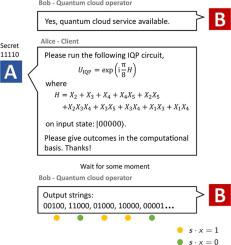Science Bulletin ( IF 18.8 ) Pub Date : 2020-08-12 , DOI: 10.1016/j.scib.2020.08.013 Xi Chen 1 , Bin Cheng 2 , Zhaokai Li 1 , Xinfang Nie 1 , Nengkun Yu 3 , Man-Hong Yung 2 , Xinhua Peng 1

|
An important task for quantum cloud computing is to make sure that there is a real quantum computer running, instead of classical simulation. Here we explore the applicability of a cryptographic verification scheme for verifying quantum cloud computing. We provided a theoretical extension and implemented the scheme on a 5-qubit NMR quantum processor in the laboratory and a 5-qubit and 16-qubit processors of the IBM quantum cloud. We found that the experimental results of the NMR processor can be verified by the scheme with about error, after noise compensation by standard techniques. However, the fidelity of the IBM quantum cloud is currently too low to pass the test (about error). This verification scheme shall become practical when servers claim to offer quantum-computing resources that can achieve quantum supremacy.
中文翻译:

近期量子云计算的实验密码验证
量子云计算的一项重要任务是确保有一台真正的量子计算机在运行,而不是经典模拟。在这里,我们探讨了密码验证方案在验证量子云计算方面的适用性。我们对该方案进行了理论扩展,并在实验室的 5 量子比特核磁共振量子处理器和 IBM 量子云的 5 量子比特和 16 量子比特处理器上实现了该方案。我们发现核磁共振处理器的实验结果可以通过该方案进行验证,大约误差,通过标准技术进行噪声补偿后。然而,IBM量子云的保真度目前太低,无法通过测试(大约错误)。当服务器声称提供可以实现量子霸权的量子计算资源时,该验证方案将变得实用。











































 京公网安备 11010802027423号
京公网安备 11010802027423号